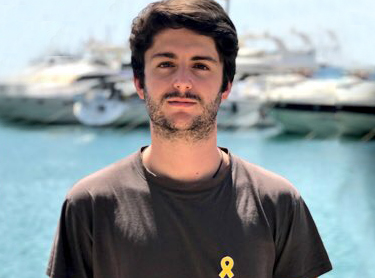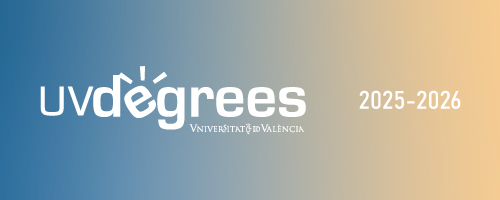
21 june 2018
I chose this grade because it was an unexplored territory. When we are in high school, we know a dozen or so authors (without almost going into depth) and I was curious to know what the literary history of my country was. I've always liked reading and it was a way of combining a taste for reading with a pleasure to be able to do it in my own language.
UV had almost no weight in my choice, that is to say, it was the closest and as it has prestige I did not hesitate to put the UB or others as a possibility.
The paperwork is a little expensive, because when you do it for the first time you are at a time when you have a lot of nerves. The rest, already in the upper grades, is a bit heavy due to the fact that they have to follow an order that you don't know: trunks, second language and optional, in second grade. If you don't do it that way, he won't let you have access to the electives. Still, it's quick to learn.
The most important subjects for me are Contemporary Literature, Medieval and Modern Literature, Orientation (of great importance) and Historical Grammar.
The facilities allow a good development. As for methods of innovation, there is not much, in poetry itself, where we did games and competitions among ourselves related to the subject matter. However, I think there is a fairly fluid relationship with most teachers, a fact that you authenticate when you leave your grade and see what the rest are like: power points, passivity... I'm in third grade and I still haven't had any teachers to read your notes.
Other complementary training activities have been made possible, but only in the language subjects, although they do provide us with lectures and conferences.
On the other hand, the curriculum, in general, is well adapted. Even so, there are some subjects that seem out of place, such as Literature Theory in first grade, or the leap between doing Latin in first grade, doing nothing in second grade and then a subject like Historical Grammar.
As for the internships, I have not yet done the meeting, but in my grade they are mandatory. The duration, as far as I know, is up to 72 hours. Self-practice is not valued in our practices. In spite of this, I wanted to find a publisher in Barcelona and I spoke to Miquel Nicolàs and he did not put any impediment, just that some information is required due to the fact that these new internship areas are not in the Universitat de València’s stock exchange. I do not know the conditions in the first person, but they are not remunerated, a fact that I consider excessive. You don't have to pay the same as someone else because your knowledge is less, but working for free should be forbidden, and even more so when you have to work for a company in a faraway place, it's up to you to pay for the trip as well. In short, you lose money to go to work. On the possibilities of making contact, my experience of finding an internship has allowed me to make professional contacts, but I understand that this is an isolated case.
I had already decided to take a master's degree before taking the degree, but as the degree progresses you will see the range of possibilities, some of which I did not know. The degree I chose has a certified master's degree associated with it.
I want to complete my training with a master's degree because I think my career is too theoretical not to do a master's degree in education (for example). I mean, you have a lot of concepts, but you don't have any subjects that will help you grow as a teacher. This is one of the problems that we have: those of the teaching profession do not know half of it, but they know how to teach it, and those of the philologies know twice as much, but we do not know the ways of transmitting it.
As for career opportunities, I know them, even though I have known more over the years. I know about the existence of scholarships within the faculty, and about the perspectives, I used to have less than now, because the first term of the degree: Latin, Spanish, Orientation, Literature Theory... is very general and you don't find your own Catalan space, only with a subject (Catalan Language), but you slowly get a taste for the degree, even though it is a little up and down (third, for people of pure literature it happens a little bit charged).





.jpg)








